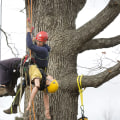The Master Arborist or Master Arborist Certified Board credential identifies professional arborists who have achieved the highest level of aboriculture offered by the International Arboricultural Society (ISA) and one of the two highest levels in the field. Arborist (practicing arborist, practicing arborist): a general term meaning anyone who specializes in caring for woody plants, especially trees. The term does not specify any particular level of competence. Arborists care for individual trees while foresters manage tree populations.
For example, a forester may be responsible for managing a forest or woodland for the production of wood or other wood products. The ranger will make decisions about when and how to plant and harvest trees to meet their management objectives. Urban foresters manage the public tree population in a community to maximize the benefits provided by trees, while minimizing the inherent risk of living near these trees. A municipal forester would be an urban forester working for a particular town or city that manages public tree resources in that municipality.
This would include trees in parks and other public green spaces, as well as street trees and trees that grow in other municipal rights of way. An ISA-certified arborist has a basic knowledge of arboriculture and recognition from the International Arboricultural Society (ISA). Certified arborists must maintain their certification every 3 years, either by taking continuing education credits or retaking the test. Every three years, the arborist must purchase 30 continuing education credits or retake the exam to maintain their certification and stay up to date on arboriculture practices and standards.
It is by no means a guarantee that an arborist is skilled or knowledgeable, but it does provide a general guarantee that they know the basic principles of their profession and that they want to follow generally accepted best practices in that profession. In addition to providing general recommendations on tree care, consultant arborists can offer tree value assessments, tree risk assessments, expert witness testimony, and litigation support services for lawyers, insurance companies, homeowners, and managers of properties. Consulting Arborist: A person with five or more years of professional experience as a certified arborist and who has documented training and reporting experience and 240 hours of approved educational units; or an ASCA member. An ISA Board Certified Master Arborist is an elite specialist in the arboriculture industry and has years of experience and studies to his credit.
He is a member of the International Arboricultural Society and the American Society of Consultant Arborists. Certified Arborist: An arborist certified by a professional organization such as the International Arboricultural Society (ISA). Consultant arborists differ from practicing arborists in that they are, as the name implies, primarily consultants. There are many terms in use that describe different types of tree care professionals, and this can cause considerable confusion for an owner or property manager who needs a tree care provider.
Plunkett has distinguished himself within his profession by earning the highly respected credentials of ISA Board Certified Master Arborist and New Jersey Certified Tree Expert. Many homeowners and property managers hire a consultant arborist when they require the opinion of an independent expert on issues related to tree care. Ultimately, it is best to view these two fields Horticulture and Arboriculture as separate jobs that are best left to their respective professionals, landscapers and arboriculturists. However, for the health of your trees and the safety of your family, it is best to entrust tree services only to certified arborists.
.






